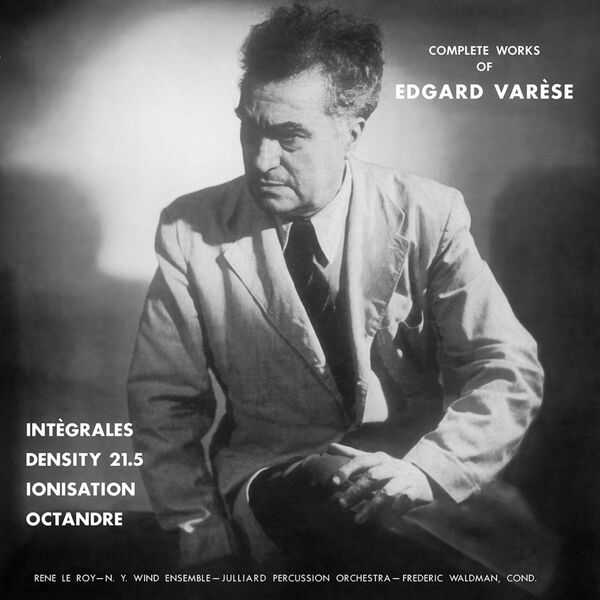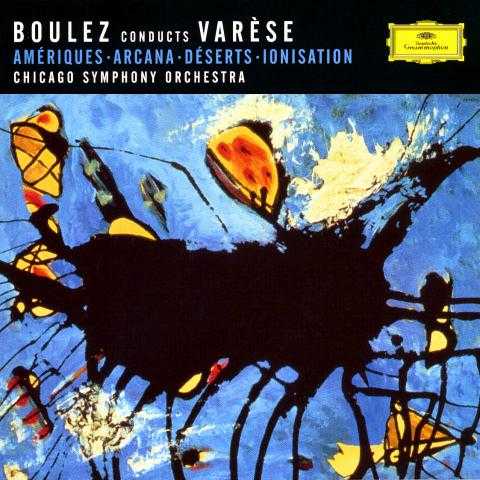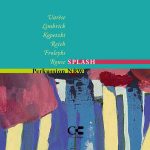
Composer: Edgard Varèse
Orchestra: Juilliard Percussion Orchestra
Format: FLAC (tracks)
Label: EL records
Release: 2007
Size: 119 MB
Recovery: +3%
Scan: cover
01. Integrales
02. Density
03. Ionisation
04. Octandre
05. Interpolations From Deserts (Version 1)
06. Interpolations From Deserts (Version 2)
07. Interpolations From Deserts (Version 3)
This él disc, titled as it was when it first came out on an EMS LP in 1950, Complete Works of Edgard Varèse, Vol. 1, has an interesting and storied history. Made by the short-lived Elaine Music Shop label and featuring groups from Juilliard led by Frederic Waldman, this was to be the first volume of two or three to feature what was then considered Varèse’s “complete” works. Nevertheless, as EMS went out of business, there was no follow up; aspiring composer Frank Zappa discovered a copy of this album being used as a demonstration disc for high-fidelity playback systems in a department store, and a career — his — was born. Zappa later recounted this formative experience, and others relating to Varèse, in a 1971 essay entitled “Edgar Varèse: The Idol of My Youth,” which was included in the liner notes of the second LP issue of this album on the Finnadar label in 1979. This was titled simply The Varèse Album, just like a CBS two-LP set then already available. Finnadar, unfortunately, did not survive into the digital era, and while the él disc represents the long-awaited first release of this classic recording on CD, unfortunately it does not bring along with it Zappa’s essay. Zappa’s comments are summarized — make that cannibalized, almost whole — as part of a three-page essay by Christopher Evans.
One important element this reissue carries over from the Finnadar verbatim is the inclusion of the three monophonic electronic inserts made for the orchestral work Déserts at the ORTF in Paris 1954. Varèse later replaced these with stereophonic interpolations, effectively orphaning the monophonic ones, and it is nice to hear them apart from the larger work. Although Varèse himself supervised the entire EMS project, it should be mentioned that conductor Frederic Waldman, who later distinguished himself on Decca Gold Label recordings mostly never re-released on CD with Musica Aeterna, was quite sympathetic to Varèse’s general style; certainly more so than Robert Craft, who recorded the balance of Varèse’s cycle for CBS. It is a shame that the second EMS disc wasn’t made so we could hear a Waldman-led Offrandes or Hyperprism.
From a recording perspective, Complete Works of Edgard Varèse, Vol. 1, was state of the art in 1950. EMS was utilizing magnetic tape technology new to the whole recording industry at the time, and through patience and care achieved results that rivaled, even exceeded what both RCA Victor and Columbia could do at that time. However, by twenty first century standards, the EMS recording is an antique; one should not pick this over those made by Kent Nagano, Riccardo Chailly, or Pierre Boulez simply because Zappa loved these versions so much; the age of the recording is most readily apparent in Ionisation. Varèse always sought to transcend the limitations of the instruments and technology of his time, and digital recordings do succeed in significantly transmitting more of his sonic world than ancient monophonic recordings like these could ever have hoped to. The historic value of Complete Works of Edgard Varèse, Vol. 1, however, is extremely high, and these performances were among very few Varèse endorsed in his own lifetime; for devotees of the composer, that should be enough of a motivating factor. From a purely performance standpoint, the version of Octandre here can stand with any recording of this work made, past or present. Listeners unfamiliar with Varèse wishing to sample may want to try a more contemporary recording to experience Varèse’s unique sound world in its full aspect.



